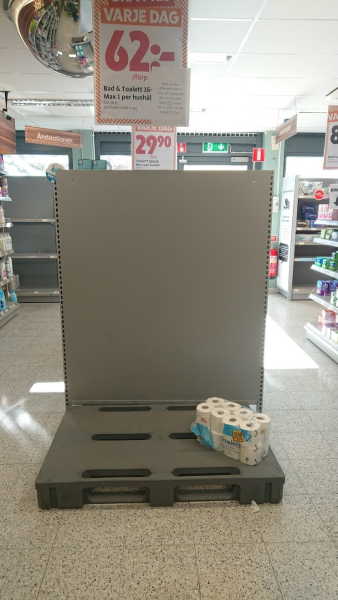This is a post about Swedish myths and legends. Not the ones about Thor, and Odin, and Freya. If you want Norse mythology Neil Gaiman’s book is quite entertaining. No, this post is about the stories that people far from Sweden tell about this country.
I once was interviewed by Google’s country manager in Ireland. He admitted that he liked to cultivate an air of Willy Wonka’s Chocolate Factory about the place for outsiders. Sweden seems to have developed a similar aura. It is prosperous, well governed, and has an outsize impact on the world. But stuck all the way up here in the frozen north not many visit. So it has become a canvas for people to paint their own pictures upon.
It is the land of Abba, of blondes, of Vikings! It is a social democratic paradise! Or lately because of Covid-19, it is a beacon of liberty and freedom in a world gone mad with nanny-state health regulations! Funny how it is simultaneously a poster child for both the left and the right.
Those of us who actually live here can be amused and exasperated by this. As an expat immigrant who is still connected to the media back home, you do hear various questionable tales told of Sweden. I thought I should call BS on a few. In no particular order…
“There are no strikes in Sweden” – I remember hearing this as I wondered whether I would be able to fly to Ireland because SAS cabin crew were having a dispute. While strike rates are low, only 7,500 days in total in 2019, Sweden does have them. But there are strong cross industry work agreements between unions and employers, so serious disputes are rare.
“Sweden is moving to a 30 hour work week” – I wish! When I first started hearing this I would have been really happy with just working 40 hours a week. There was a lengthy trial. There were some positive results. But it wasn’t suggested this would become the norm for the country. The legend was born though! And now if I had 10kr (about €1) for every retweet or facebook share of it I probably would be down to a two day week myself.

“Sweden is a tolerant and open minded society“. This is mostly true. Stockholm’s Pride week is a huge celebration of values that are still marginalised (or worse) in some places in Europe. But what if you are talking about vices? Alcohol is only sold in the state run Systembolaget shops with restricted hours, and high prices. There are strict laws for illegal drugs, with severe penalties for possession which are based on a zero tolerance policy and no distinction between hard and soft. And the approach to sex work is to criminalise the buyer, something which is, er, controversial.
“Sweden has more public holidays” – I had a debate with an Irish Labour party researcher about this one. Yes Sweden has 13 public holidays this year, whereas Ireland has 9. Two of the Swedish ones are Easter Sunday and Whit Sunday which em, fall on Sunday each year. That takes us down to 11. However in Sweden (just like Austria when I lived there) the holidays are on fixed dates. With one or two exceptions, if they fall on a weekend they are lost. This year 3 of the days fell on a Saturday. So we will have 8 in total. And while it isn’t specifically Swedish, the person commented on having holidays evenly spread out during the year. Sweden cares not for such things! Our last public holiday was Midsommar eve on June 19th. The next one is Christmas day! You can do the maths yourself 🙂
“All Swedes are blondes” – Sometime around 2007 a Swedish woman admitted to me that her blonde hair came from a bottle, and she was not unusual in that. That was the day my Swedish dream died, and I have never fully recovered.
“Swedish has achieved gender equality” – Yes, Sweden is ranked as amongst the best in Europe. There are more women in the Swedish parliament (46%), company boards (over 30%), the gender pay gap is narrower (women receive 95% of men’s pay), and there is generous parental leave which includes a requirement for men to take time off. But more can be done. Women still take more of the burden of child rearing, of housework, and they still face disadvantages in the workplace.
Sweden’s Healthcare System – In Ireland you will often hear the complaint that the health care system is “third world” – there are waiting lists, long queues at A&E, people sleep on trolleys. “If only we had a system like Sweden” they cry. Well when I broke my wrist ice skating in 2017 it took 7 hours from contacting the health sevices to getting out the door with a cast. I am told that is about the usual. A year ago I spent 17 hours in A&E! Around 02:30 am they wanted to admit me to the hospital, but they had no beds. I was to be admitted on paper, but would have to sleep in the waiting room. Sound familiar? The system here is very good. I have no complaints about the quality when I have needed something for me or my family. But it has a load of its own problems too (getting to talk to a GP is considerably easier in Ireland).
Sticking with healthcare, it has been the year of covid, COVID, Covid-19, Covid. And because of Sweden’s different approach to managing the pandemic there have been a load of stories around the world about what Sweden is doing and why. Though many of the people writing them do not seem to have checked with Sweden on what is actually happening on the ground. So some Covid myths…
“There were no shortages in Sweden” – I was told that Sweden had not experienced any product shortages in Spring 2020. Hahahaha. Despite the fact that Sweden produces about 3 million rolls of toilet paper per day – we had panic buying and loo roll shortages as well.

The biggest Covid myths have been about how exactly Sweden has tackled the pandemic. And unlike the other myths these are more of a right winger thing. I have seen it said “There are no lockdowns”. “There are no restrictions”. “Sweden is pursuing a ‘herd immunity’ strategy”, and so on. This is one area where Swedes get defensive. They feel the national approach has been misrepresented, Sweden’s particular circumstances downplayed, and they are being used to justify other’s agendas. I would say they are right.
Sweden has implemented restrictions, they just have differed from the full lockdowns elsewhere. But their situation is different too. Half of Swedish households are single occupant. There is a broad, deep social welfare net to protect workers who are ill – so people have no hesitation to “stay home if you are sick“. The Covid campaign is directed by a respected expert, Anders Tegnell, and Swedish people mostly follow the guidelines without grumble. The focus has been on a sustainable long term management of the pandemic – measures that people can live with for 12-18 months.
There are issues of course. The disease badly hit elderly homes and immigrant communities. Infection and death rates have been higher than in surrounding countries. Dr Tegnell has said he should have recommended more was done in the Spring. Right now we are experiencing a second wave, and restrictions have been tightened. But in general when you talk to Swedes they feel that: first they are happy with how things are being handled. Second Sweden’s approach works for Sweden, they would never suggest they have the answer for the rest of the world. And third, this is a long-term campaign. It is only at the end will people be able to properly assess how effective it has been.
One thing that everyone is very clear on, is that Sweden is NOT following a “herd immunity” strategy. They are not letting the disease run through the young and healthy (claiming a few thousand along the way) in order to protect the vulnerable. If that was the plan, you can see it isn’t working too well. It’s estimated that about 20% of Sweden has been exposed to Covid at this stage. Herd immunity needs about 70-80% of the population with antibodies. It would take over 2 years at this rate (and tens of thousands of deaths) to acheive it. So no, that is not the Swedish Covid strategy.
I think Sweden is a wonderful country. There is a lot about it I love. The people and the political system here have done a great job building what is a pretty fair, just and equitable society. Which of course is why it scores so strongly on different indices of Human Development, Democracy, Corruption, Quality of Life, etc.

It is not paradise though. It has challenges too – political, social, economic. And you try finding decent bagels, or Barry’s Tea here. Also I am told the Guinness is generally shocking.
Many places can learn a lot from Sweden. But simple lift and shift rarely works. The unique Swedish society, and history, and geography, and economy come together to make Swedish solutions work in Sweden. But it does help if the wonderful Swedish idea you want to adopt, or the Swedish outcome you want to achieve is actually real, and not just another myth as tangible Odin himself.

Recent Comments